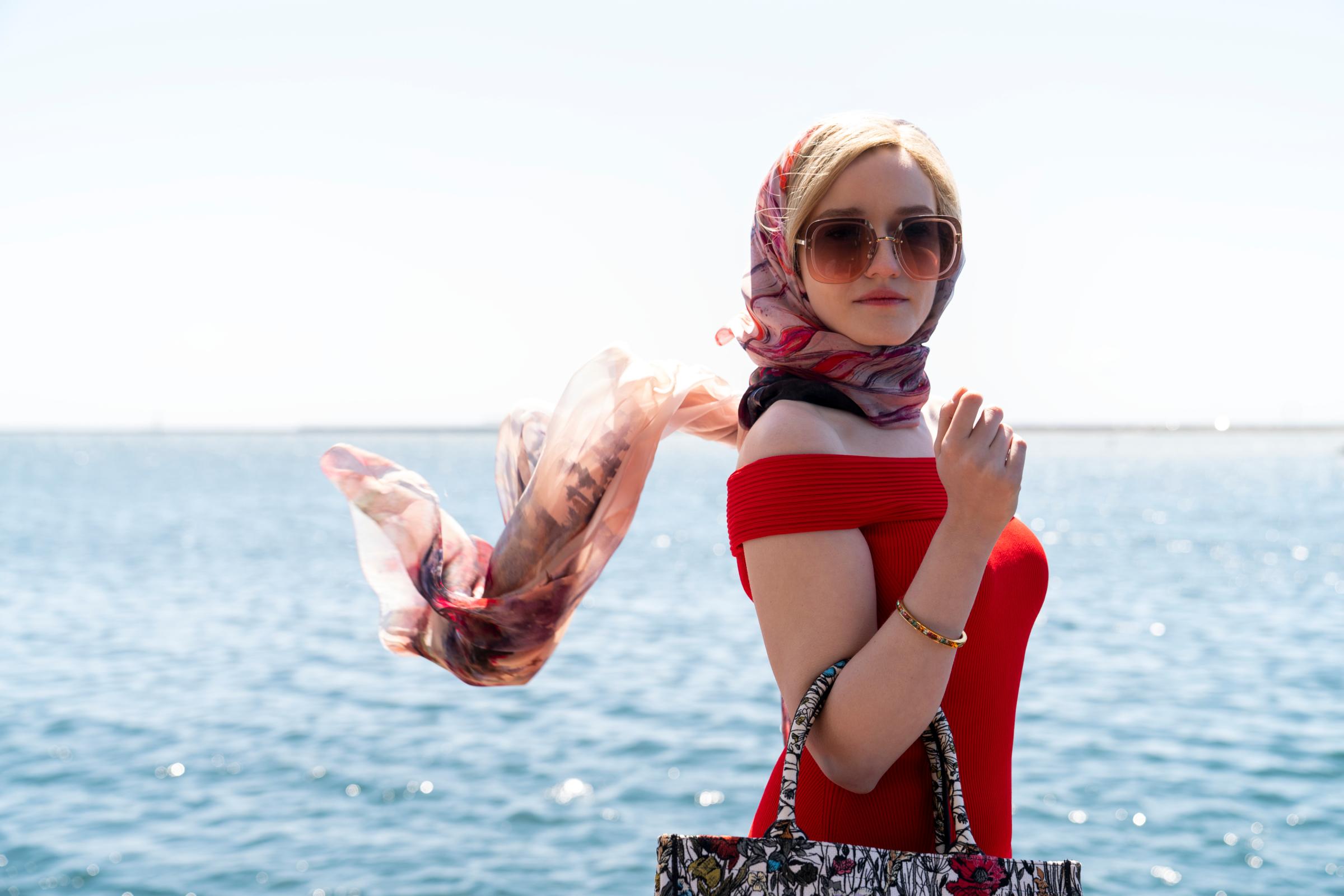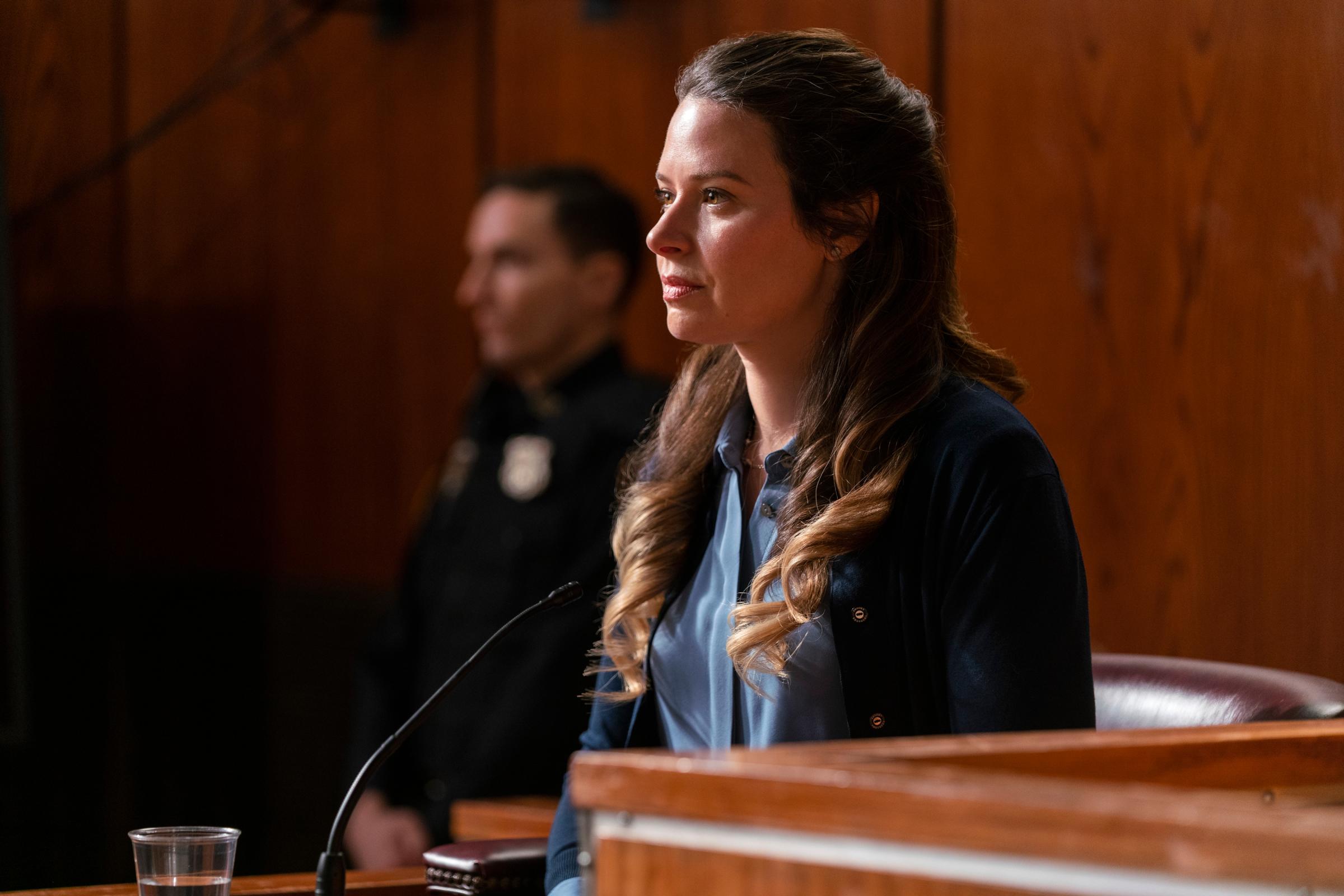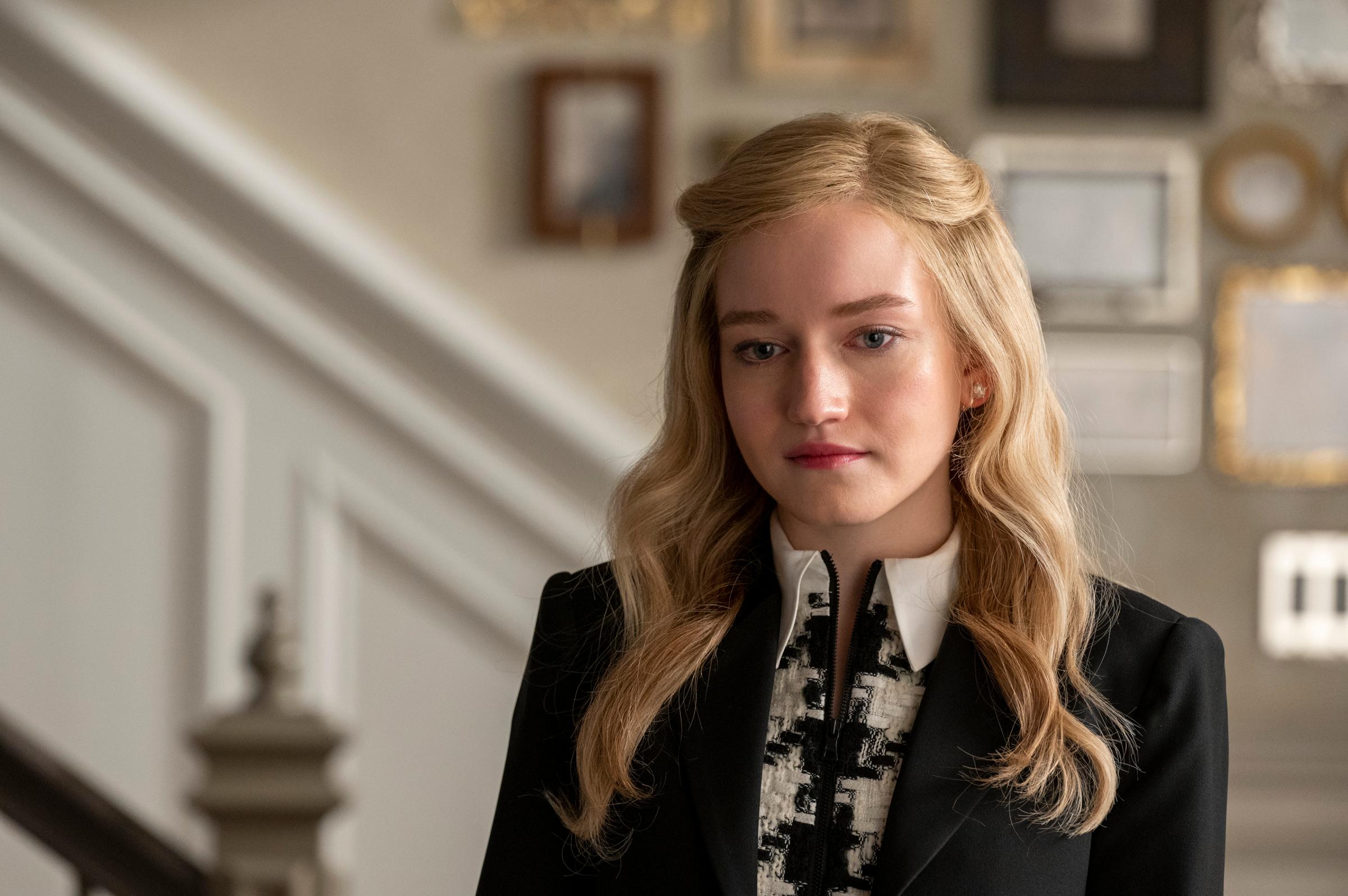Each episode of Netflix’s limited series Inventing Anna, streaming Feb. 11, begins with a disclaimer: “This whole story is completely true. Except for all the parts that are totally made up.” It’s a tongue-in-cheek warning to viewers that fact-checking Shonda Rhimes’ latest show for the streamer won’t be easy. But anyone who has heard of Anna Delvey (née Sorokin) probably already knows that.
In 2018, New York Magazine broke the internet with journalist Jessica Pressler’s story about an alleged German heiress who was accused of stealing hundreds of thousands of dollars from banks, financial institutions, and her friends between the years of 2013 and 2017 in hopes of launching a member’s only club called the Anna Delvey Foundation. Turns out, Sorokin was really a Russian-born, German-raised scam queen who somehow fooled New York’s super rich and powerful to bow down to her to the tune of more than $275,000. (Her parents told New York Magazine that despite their daughter’s claims, there was no trust fund to speak of and “Delvey” was not a family name.)
The story of Sorokin’s spectacular grift quickly turned the “fake German heiress,” into a scammer that the internet either loved to hate or hated to love. She was a folk hero for those who felt the wealthy never pay their share or, for others, an example of millennial malaise at its worst. Despite being convicted in 2019 on eight counts, including three counts of grand larceny and one count of attempted grand larceny, Sorokin continues to claim that her plans for the Anna Delvey Foundation were entirely legit. “I’d be lying to you and to everyone else and to myself if I said I was sorry for anything,” she told the New York Times in 2019. “I regret the way I went about certain things.” (Sorokin has been in the custody of the Immigration, Customs, and Enforcement agency (ICE) for overstaying her visa since March 2020, following her release from prison one month earlier.)
Inventing Anna is inspired by Pressler’s extensive reporting. (She is also an executive producer on the nine-episode series.) The show follows journalist Vivian, a character loosely based on Pressler and played by Veep’s Anna Chlumsky, as she investigates Anna’s complicated story. The stylish drama attempts to tell Sorokin’s story through the eyes of those who knew her—or thought they did. (Netflix reportedly paid Sorokin $320,000 to adapt her life into a TV show, which she told Insider she doesn’t plan to watch.)
Inventing Anna skillfully shows how Anna (a German-accented Julia Garner) was able to take everyone under her spell. Anna is portrayed as a visionary genius with a knack for business, but the show doesn’t deny that she was also a liar, manipulator, and all-out hustler. (Fun fact: Pressler also wrote the article that inspired Jennifer Lopez’s 2019 film Hustlers.)
This dichotomy is what leaves so many who cross paths with her on the show—and in real life—puzzled by the “Soho grifter.” “For every three crazy things you hear about her, one usually turns out to be true,” Vivian says. She’s not wrong. The “facts” of this story need to be taken with a grain of salt since Anna is an unreliable narrator who prefers to live in her delusions of grandeur. The truth is, the more you know about Anna Delvey, the less you might understand her—but that’s part of her appeal.

Keep reading to find out what Inventing Anna gets right or right-ish, depending on who you believe:
Was Jessica Pressler trying to repair her journalistic reputation with the Anna Delvey story?
Early on in Inventing Anna, viewers learn that Vivian is persona non grata in many newsrooms due to a previous Manhattan Magazine article she wrote that turned out to be inaccurate. The story was about a 16-year-old New York high school student named Donovan Lamb, who claimed he had made $80 million on the stock market “before he could drive.” Vivian alleges that the boy lied to her, while the teen claims that she was just after a flashy story and didn’t care about the facts.
In the wake of the article, Vivian has a job offer rescinded from Bloomberg News and is relocated to the dregs of the magazine’s office, affectionately known as “Scriberia.” For Vivian, Anna’s story is a way of proving she is not the “bad journalist” everyone thinks she is.
Whether it was intentional or not, the Anna Delvey story did become a form of redemption for Pressler. In December 2014, the New York Observer revealed that the New York Magazine story she wrote earlier that month about a Stuyvestant High School senior named Mohammed Islam, who claimed to have made $72 million trading stocks, was a hoax. “It is not true,” Islam told the newspaper. “I run an investment club at Stuy High, which does only simulated trades.” A spokesman for the teen told the publication, “Mr. Mohammad Islam fibbed to a reporter and for this he is very apologetic.” His parents were reportedly furious with him.
The fib led to Pressler losing her job on the Bloomberg investigative unit before it started. The journalist has defended her reporting of the story. “I still think the piece is skeptical enough,” she told CNNMoney in 2014. “The story says, ‘This is a rumor and draw your own conclusions.'” Instead, she said she felt the real problem was the article’s headline, “A Stuyvesant senior made $72 million trading stocks on his lunch break.” “I feel like the headline was pretty glib,” she said at the time. “I feel comfortable about what’s in the actual piece.”
New York Magazine, which continues to employ Pressler, issued an apology to its readers for the story’s inaccuracies: “We were duped. Our fact-checking process was obviously inadequate; we take full responsibility and we should have known better.”

Did Anna Delvey pretend to be her family’s alleged business manager Peter W. Hennecke?
As Garner’s Anna inches closer to getting her loan for the Anna Delvey Foundation, viewers are introduced to her family’s business manager Peter Hennecke. Well, we never see him, but we hear his calm, cool, and collected voice in long distance phone calls from Germany, swearing to Anna’s bankers that the wire transfer he sent would come through any day now. The show later reveals that Anna created Mr. Hennecke as part of the scam, using a virtual sim card to clone a German number and a cheap voice changing app to disguise her voice.
The real story of Hennecke might be even more bizarre. In 2018, New York Magazine reported that Hennecke’s cell number “belonged to a now-defunct burner phone from a supermarket.” Anna was also probably the one who had been writing emails from Hennecke’s AOL address—an odd choice for anyone in 2018, but especially someone working for UBS, the world’s largest private bank.
Later, when emails to Hennecke started bouncing back, Sorokin claimed that he had died. “Peter passed away last month,” she wrote in correspondence with her business partners, according to New York Magazine. “Please refrain from contacting or mentioning any communication with him going forward.”
Following the loss of her supposed accountant, she introduced her family’s new advisor “Bettina Wagner,” who was also believed to be a figment of Sorokin’s imagination. During her closing arguments, prosecutor Catherine McCaw revealed, according to Rolling Stone, that Sorokin created fake email addresses for Bettina by Googling “send untraceable fake emails” and “non-existent email that is not going to bounce back.”
Read More: Anna ‘Delvey’ Sorokin Almost Ruined My Life. Now She’s Being Rewarded for Her Crimes

Did Anna Delvey steal a jet?
Viewers may think “steal” is too strong a word for what Anna did. Garner’s Anna requests a private jet to take her to Omaha, NE for billionaire businessman Warren Buffet’s Berkshire Hathaway Conference by pretending she was friends with the jet company’s CEO. Anna is basically able to walk onto a jet without paying, no questions asked.
Sorokin really did convince workers for Blade, an app used by the rich and famous to book private planes, to “charter her a $35,000 jet to Omaha by sending them a forged confirmation for a wire transfer from Deutsche Bank,” according to Pressler’s New York Magazine article.
Like her onscreen counterpart, the real Anna claimed to know Blade’s CEO Rob Wiesenthal, whom she had met at the popular New York City night spot Soho House, which is why she wasn’t required to pay before boarding. “We’ve let people slide in the past, quite frankly, and they’ve paid,” Kathleen McCormack, the former CFO of Blade, testified in 2019, according to Rolling Stone. She also said that because Wiesenthal “had briefly socially run into her, and him knowing [Sorokin] through those circles, we felt she was good for payment so we booked her for the flight.”
Following McCormack’s testimony, Spodek told Rolling Stone that, in his opinion, Sorokin didn’t steal a jet. Her free ride was merely a case of quid pro quo. “They believed she was some German heiress,” he said. “They believed she was some trendsetter who was gonna Instagram it up. And they gave her the plane.”
Did Anna Delvey’s former friend Rachel Williams help set up a sting operation while the fake heiress was in rehab?

Inventing Anna’s portrait of Anna’s former friend Rachel (Katie Lowes) is not sympathetic. In the show, Anna stiffs Rachel out of $62,000 for a Moroccan hotel stay after all her credit cards are declined, forcing Rachel to put the cost of the stay on a work credit card. Later, Rachel helps police arrest Anna while she’s at a rehab center in Malibu.
The real Rachel Williams, who was a photo editor at Vanity Fair at the time of the aforementioned alleged events, first met Sorokin in 2016 and the two became fast friends. “For the rest of 2016, I saw Anna every few weekends,” Williams wrote in 2018 for Vanity Fair. But the pair had a falling out in 2017 after Sorokin allegedly failed to pay Williams back for a more than $60,000 hotel bill tied to a trip to Marrakech. “The vacation was Anna’s idea,” Williams wrote in Vanity Fair. She claimed that Sorokin chose to stay at La Mamounia, “a five-star luxury resort ranked among the best in the world, and knowing that her selection was cost-prohibitive for my budget, she nonchalantly offered to cover my flights, the hotel, and expenses.”
Williams claimed that Sorokin promised to “forward a wire confirmation as soon as possible” and she believed her friend was good for the money. However, once Williams returned to New York, she said Sorokin’s “texts became increasingly Kafka-esque: assurances of incoming reimbursements through varying methods of payment that never materialized.”
In her 2019 memoir, My Friend Anna, Williams wrote that she was integral to Sorokin’s October 2017 arrest and bringing her to justice. After Sorokin failed to show up to court on misdemeanor theft of services charges in Sept. 2017, Williams claimed that New York law enforcement asked her to help them find her former friend. “My goal was to re-establish contact, and uncover her location,” she wrote in her memoir, noting she figured out Sorokin was staying at the luxury Malibu treatment center, Passages.
Sorokin, like on the show, was apprehended by the police on Oct. 3, 2017 as she left Passages thinking she was going to meet Williams for lunch at the restaurant Joan’s on Third. In her memoir, Williams wrote that following Sorokin’s arrest, she texted her former friend, pretending as if she was at the restaurant and couldn’t find her. “I never went to Joan’s on Third for lunch, so why bother pretending that I had?” Williams wrote. “Was I afraid that she would discover my involvement in her arrest? Most definitely. But that wasn’t the only reason. As Anna had done with me, I wanted her to believe my lie.”
Sorokin has “never admitted any guilt” for what happened in Morocco, according to New York Magazine. But she did show a little remorse for what Williams went through. “I am very upset that things went that way and I didn’t mean for it to happen,” Sorokin told the magazine in 2018. “But I really can’t do anything about it, being in here.”
Williams expressed concern over Inventing Anna’s portrayal of her relationship with Sorokin in a 2022 piece for Time. “It will be seen by more people than will ever meet Anna or do the work to understand her real nature or what really happened,” she wrote. “And that is a dangerous reality.”
Read More: Anna ‘Delvey’ Sorokin Was My Friend. Here’s How I Helped Bring the Fake Heiress to Justice
Did Anna Delvey know Fyre Festival founder Billy McFarland?
In episode 4, Anna is working in a communal workspace alongside a guy named “Billy,” who is putting together a luxury music event called Fyre Festival with “Ja freaking Rule.” When he tells Anna about the name of the fest, she poo-poos the whole thing. “Fyre with a ‘Y’?” she asks as he lets her know the letter is important in numerology. “Are you serious?” Oh, he was.
McFarland crossed paths with Sorokin before he defrauded investors and tricked people into attending the “festival” for $1,000 a ticket. (He is currently serving six years in jail on fraud charges.) In 2018, the New York Post reported that Sorokin owed McFarland money for a Soho loft she had stayed in five years earlier. She allegedly moved into the headquarters of McFarland’s credit card company Magnises in 2013 and didn’t pay her rent. “Anna knew people on Billy’s team,” an insider told the Post. “She just asked to stay for a few days … then she wouldn’t leave.”
The same source said that McFarland “hinted” for her to leave, but she only left after the company moved its headquarters to a different location. “That’s the only way they got her out!” the insider said. “She had been there for four months!” (Sorokin has not commented on the claims.)
Sign up for More to the Story, TIME’s weekly entertainment newsletter, to get the context you need for the pop culture you love.
Was Anna Delvey friends with “Pharma Bro” Martin Shkreli?
In episode 5, Anna’s friend Neff—played by Alexis Floyd and inspired by Sorokin’s real friend Neffatari “Neff” Davis—recalls a rather eventful night out with the fake German heiress. She claims they partied with a Culkin (she’s not sure which one) and Martin Shkreli, better known as the “Pharma Bro,” the former drug company executive who, in 2018, was sentenced to seven years in prison for securities fraud. He’s also the guy who bought Wu Tang Clan’s rare album Once Upon a Time in Shaolin in 2015, which is why more than one character on Inventing Anna refers to him as the “guy who disrespected the Wu Tang Clan.”
In Pressler’s article, the real Neff explains that during a dinner at Le Coucou she was introduced to Sorokin’s “dear friend” Shkreli, who told New York Magazine in a letter from the penitentiary in 2018 that she was friends with one of his executives. That night was the one and only time they hung out, but “Anna did seem to be a popular ‘woman about town’ who knew everyone,” he wrote. “Even though I was nationally known, I felt like a computer geek next to her.”
As for whether Shkreli played leaked tracks from Lil Wayne’s Tha Carter V during that dinner as Inventing Anna claims, the real Neff said he did. She actually tweeted about the encounter, which upset Sorokin. “I wanted everybody to know that I heard this album that the world is waiting on! But Anna was pretty mad,” she told New York Magazine. “She didn’t come down to my desk for maybe three days.”
Shkreli was forced to forfeit the Lil Wayne album, along with a Picasso painting and the Wu Tang Clan record, after he was convicted in March 2018. The rapper would officially release the seven-years in the making project six months later.

Did Anna Delvey hire a professional stylist for her court appearances?
In preparation for her trial, Garner’s Anna enlists a stylist friend of Neff’s to help her look like a “HBIC, but also young and coquette.” In real life, Sorokin’s personal dresser, a close friend of the real Neff, was more of a rocker at heart. In 2018, GQ revealed that Sorokin was being dressed by Anastasia Walker, a stylist whose celebrity clients include Courtney Love, Madonna, and G-Eazy
In an email to GQ, Spodek justified hiring the stylist by explaining that it was “imperative that Anna dress appropriately for the trial. Anna’s style was a driving force in her business, and life, and it is a part of who she is. I want the jury to see that side of her.”
Walker told Elle that she consulted with Sorokin over the phone. “I couldn’t show her photographs, but as people interested in fashion, we spoke in references about the themes she wanted to come through [in her outfits],” said Walker, a former Glamour staffer. “I selected some timeless pieces, given that everything is so public today and [trial] photographs can be saved, potentially, forever.”
Why did Walker agree to help Sorokin? “Because of our mutual friend [Neff]. I’m always happy to help, and I love what I do,” she said. “If it works and I can make it happen, then why not?” (She also confirmed to Elle that she had been paid for her work.)
The @annadelveycourtlooks Instagram account kept track of everything Sorokin wore in court, outfits which reportedly included pieces from Miu Miu, Victoria Beckham, and Saint Laurent. As for where the high-end looks came from, Spodek told The New York Times in 2018 that his client’s clothes had been “borrowed on her behalf via a secret benefactor.” It has yet to be revealed who footed the bill for Sorokin’s wardrobe.
More Must-Reads from TIME
- Donald Trump Is TIME's 2024 Person of the Year
- Why We Chose Trump as Person of the Year
- Is Intermittent Fasting Good or Bad for You?
- The 100 Must-Read Books of 2024
- The 20 Best Christmas TV Episodes
- Column: If Optimism Feels Ridiculous Now, Try Hope
- The Future of Climate Action Is Trade Policy
- Merle Bombardieri Is Helping People Make the Baby Decision
Contact us at letters@time.com